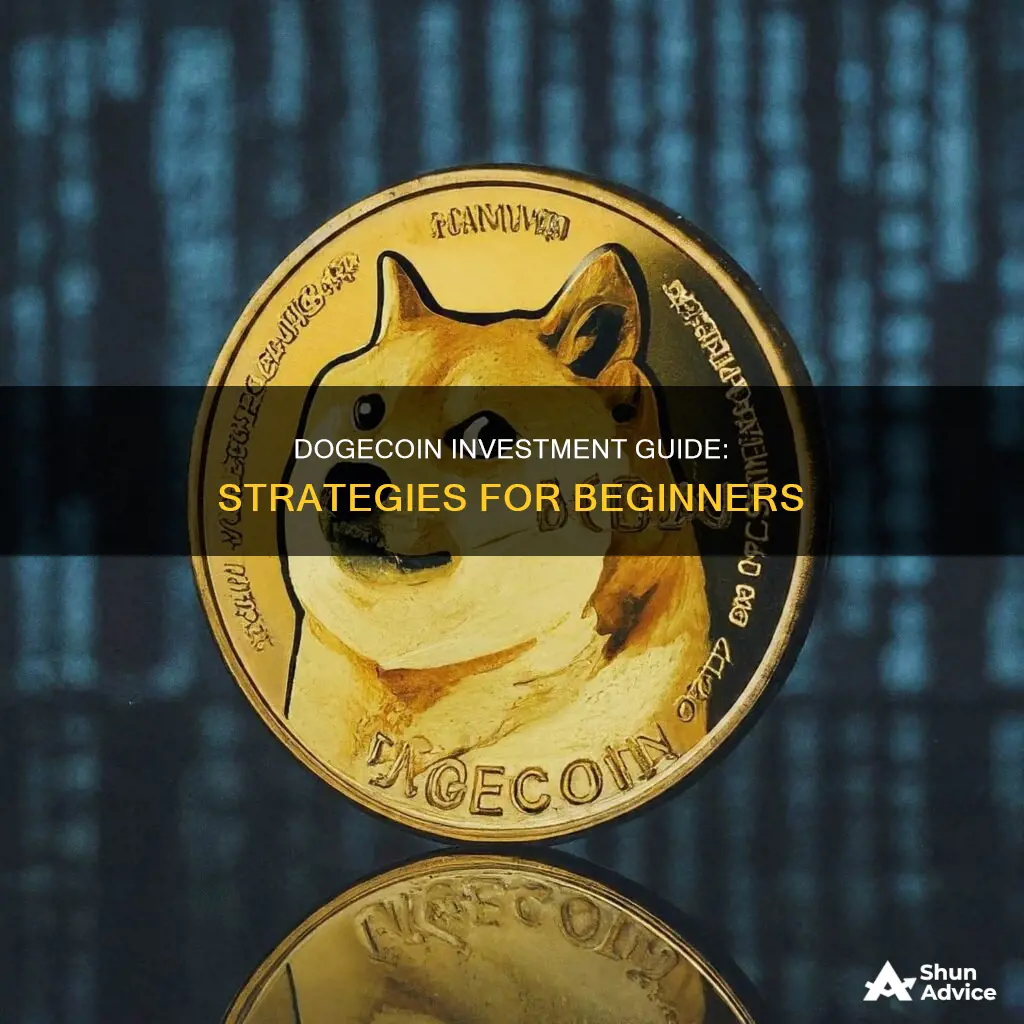
Dogecoin is a cryptocurrency that was created as a joke based on the popular meme of a Shiba Inu dog. Despite its lighthearted origins, it has gained a cult status and a passionate following, especially on Reddit. Dogecoin's value has seen massive surges, but it is also highly volatile, and its price is largely driven by social media hype.
If you are considering investing in Dogecoin, it is important to be aware of the risks involved. Cryptocurrency prices can fluctuate significantly, and Dogecoin has no limit on the number of coins that can be mined, which means its value is heavily dependent on continuous investor demand.
1. Choose a cryptocurrency exchange or brokerage platform, such as Coinbase, Binance, Kraken, or Robinhood. Ensure that the platform is legally operating in your jurisdiction and offers Dogecoin for trade.
2. Sign up for an account and verify your identity. You may need to provide proof of address and a government-issued ID.
3. Decide on a payment method. You can typically use a bank account, debit or credit card, or initiate a wire transfer. Keep in mind that using a credit card may incur higher fees.
4. Place your order for Dogecoin. Search for Dogecoin or its ticker symbol, DOGE, on the platform. Specify the amount you want to invest or the number of Dogecoins you want to purchase.
5. Consider your storage options. By default, your Dogecoin will be stored in the crypto exchange's or brokerage's wallet. For added security, you can transfer your Dogecoins to a separate crypto wallet, either a hot wallet (digital and connected to the internet) or a cold wallet (physical hardware).
| Characteristics | Values |
|---|---|
| Price | $0.0959 per DOGE |
| 24-Hour Trading Volume | $998.95M |
| Price Change in the Last Hour | Decreased by 0.28% |
| Price Change in the Past 24 Hours | Decreased by 0.19% |
| Price Change in the Past Week | Decreased by 21.80% |
| All-Time High | $0.74 |
| Current Circulating Supply | 145,441,906,383.705 DOGE |
| Market Capitalization | $145,441,906,383.705 |
| Ranking Among Assets Tradeable on Coinbase's Centralized Exchange | #10 |
| Investment Risk | High |
| Volatility | High |
| Transaction Costs | Low |
| Supported Wallets | Hot wallets, cold wallets, crypto wallets, hardware wallets, paper wallets |
| Supported Exchanges | Coinbase, Binance, Kraken, Gemini, Robinhood, SoFi, Webull, eToro, Uniswap |
What You'll Learn

Choosing a crypto wallet
Crypto wallets are a way to protect the secret information that gives you control over your digital assets. They come in two main forms: hot wallets and cold wallets.
Hot wallets are connected to the internet and are often free to use. They are more susceptible to hacking but make it easier to carry out transactions. Examples of hot wallets include MetaMask, Exodus, and Coinbase Wallet.
Cold wallets are not connected to the internet and are usually physical devices that you buy. They are harder to hack but are less convenient to use and more expensive. Examples of cold wallets include Ledger and Trezor.
When choosing a crypto wallet, consider the following:
- Security: How vulnerable is the wallet to hacking? Does it have two-factor authentication?
- Accessibility: How easy is it to carry out transactions and access your crypto?
- Cost: Is there a cost to buying and using the wallet?
- Supported assets: How many types of digital assets are supported? Does it support the cryptocurrencies you want to invest in?
- Backup options: Can you easily back up your wallet, and are there options for cold storage?
- User-friendliness: How easy is the wallet to navigate and use?
Some popular options for hot wallets include:
- Zengo Wallet: Supports over 1,000 digital assets, with advanced security protocols and no reported security breaches. However, it lacks support for some popular cryptocurrencies.
- Crypto.com DeFi Wallet: Supports over 1,000 assets and is tailored for use in decentralised finance (DeFi). It also has a desktop app that integrates with Ledger hardware wallets.
- Guarda: A free wallet that supports over 400,000 digital assets and has staking programs available.
- Exodus: Offers a mobile app, desktop app, and browser extension. It has an integration with the Trezor cold wallet and provides educational content for beginners.
- Coinbase Wallet: Integrates easily with the Coinbase exchange but lacks a desktop app.
- Trust Wallet: The official wallet of Binance, with support for over 10 million types of digital assets.
Some popular options for cold wallets include:
- Ledger: Integrates with popular software wallets and offers a mobile app, desktop app, and browser extension. It also provides educational content.
- Trezor: Offers high-end hardware and built-in services like staking and crypto purchases. It has a desktop and mobile app.
Remember, it's important to do your research and choose a wallet that suits your needs and security requirements.
Why Invest in Bitcoin: Making Money with Cryptocurrency
You may want to see also

Selecting an exchange
The simplest way to buy Dogecoin is through a cryptocurrency exchange. Dogecoin is one of the more popular cryptocurrencies, so you should be able to find it on most major exchanges.
Popular exchanges include Coinbase, Gemini, Binance, Kraken, and Robinhood. However, not all exchanges offer Dogecoin, so be sure to check that the platform you're considering has Dogecoin available for purchase.
Some other factors to consider when selecting an exchange include:
- Payment options: Most exchanges will let you deposit money from a checking or savings account. Some also accept wire transfers, PayPal transfers, or credit card payments. Keep in mind that using a credit card may incur additional fees and a higher APR.
- Digital wallet access: Some exchanges only allow you to buy and sell Dogecoin with USD and do not give you access to your own digital wallet. With a digital wallet, you can send and receive Dogecoin, which may be necessary for certain transactions.
- Security: If you plan to store your Dogecoin on the exchange, be sure to research the security measures they have in place. Some investors prefer to transfer their crypto to a separate crypto wallet to protect their coins from hackers.
- Fees: Different exchanges charge different fees for trading and transferring cryptocurrencies. Be sure to understand the fee structure before selecting an exchange.
- Ease of use: Consider how user-friendly the exchange's platform is, especially if you're new to cryptocurrency trading.
- Customer support: Look into the exchange's customer support options in case you need assistance with your account or transactions.
In addition to centralized exchanges, you can also find Dogecoin on decentralized exchanges, which allow for peer-to-peer transactions. However, decentralized exchanges typically require more technical knowledge and may not be the best option for beginners.
MDT Coin: A Wise Investment Decision?
You may want to see also

Payment methods
There are several ways to pay for Dogecoin. Here are some of the most common methods:
- Cash: You can typically use fiat currencies like the US dollar to buy Dogecoin directly on a cryptocurrency exchange. You will need to create an account and fund it from your bank account.
- Cryptocurrency: If you already own cryptocurrency, you may be able to trade it for Dogecoin. However, not all cryptocurrencies can be exchanged for Dogecoin, and each platform has different rules.
- Credit Card: Some crypto exchanges allow you to use a credit card to buy Dogecoin, but be aware that the bank will treat this as a cash advance, resulting in higher fees and interest rates.
- Wire Transfer: You can also use a wire transfer to fund your account when purchasing Dogecoin.
- PayPal: Currently, only US customers can use PayPal to buy Dogecoin or add US dollars. All other customers can only use PayPal to cash out or sell.
- Gift Card: You can use a digital gift card purchased from online merchants to redeem on some platforms for the purchase of Dogecoin.
When choosing a payment method, it is important to consider the associated fees and risks. For example, using a credit card can result in higher fees, while bank transfers may take several days to process. It is also important to only use trusted and secure platforms to avoid scams and fraud.
Kava Coin: A Wise Investment Decision?
You may want to see also

Amount to invest
Dogecoin is a highly volatile and unpredictable asset. Financial planners generally recommend investing no more than 3% to 10% of your money in such assets. This is money that you are willing to lose.
Dogecoin's price is largely driven by social media movements and hype. It is important to remember that the potential for massive returns is never guaranteed and impossible to predict.
If you are thinking of investing in Dogecoin, it is recommended that you do your research first. This is a highly speculative investment and you should only invest money that you can afford to lose.
Dogecoin's value has fluctuated wildly. In May 2021, it reached a high of about 74 cents before dropping to about 14 cents by the end of the year. In July 2023, Dogecoin was trading for a little over 7 cents.
If you do decide to invest, you can buy Dogecoin by opening an account with a crypto exchange like Coinbase, Binance, Kraken, or Gemini. You can also access Dogecoin through investment apps like Robinhood, SoFi, Webull, and eToro.
Strategizing Bitcoin Fund Investments: A Comprehensive Guide
You may want to see also

Storing your Dogecoin
Hot Wallets:
Hot wallets, or online wallets, are connected to the internet, making them convenient and accessible. They include mobile apps, browser extensions, and downloadable software. While hot wallets are widely used due to their accessibility and ease of setup, they are less secure than cold wallets. Examples of hot wallets include the official Dogecoin Wallet, the Dogechain Wallet, and the Guarda Wallet.
Cold Wallets:
Cold wallets, or hardware wallets, are offline storage options that provide enhanced security for your Dogecoin. They are not connected to the internet, making them less vulnerable to hacking attempts. Cold wallets typically offer advanced security features such as PIN codes, recovery phrases, and durable designs. Some popular cold wallets for Dogecoin include the Ledger Nano S/S Plus/X, Trezor One/T/Safe 3, and KeepKey. These wallets support a wide range of cryptocurrencies and offer varying levels of affordability and ease of use.
Paper Wallets:
Paper wallets are a simple and secure way to store your Dogecoin offline. They involve printing your private keys on a piece of paper, often with QR codes for easy transfer. While paper wallets are vulnerable to physical damage or theft, they can be stored in safe locations like bank deposit boxes. You can generate Dogecoin paper wallets using websites like WalletGenerator.net.
Additional Tips:
- Always choose wallets that have been verified by the community and have undergone security audits.
- Avoid storing large amounts of Dogecoin in hot wallets or online exchanges for extended periods.
- Consider using multiple wallets to diversify your risk and protect your assets.
- Regularly back up your wallet data and store it in secure locations.
- Enable two-factor authentication and other security measures provided by your wallet.
Bitcoin Investment: Is This the Week to Buy?
You may want to see also
Frequently asked questions
You can buy Dogecoin on a cryptocurrency exchange, such as Coinbase, Binance, or Kraken. You will need to create an account, deposit funds, and then search for Dogecoin on the exchange to make a purchase.
You can typically use fiat currencies like the U.S. dollar or other cryptocurrencies to buy Dogecoin. Common payment methods include bank transfers, debit or credit cards, and wire transfers.
Yes, investing in Dogecoin carries significant risks due to its high volatility. There is no limit on the number of Dogecoins that can be created, so its price is highly dependent on investor demand. As such, financial planners generally recommend investing no more than 3-5% of your money in Dogecoin.
You can store your Dogecoin in a crypto wallet, either provided by the exchange or a third party. Hot wallets are digital and constantly connected to the internet, while cold wallets are physical hardware that can be disconnected and are less susceptible to hacking.
Dogecoin has the potential for massive returns and is easier to mine than other cryptocurrencies. However, it is highly volatile, does not pay dividends or interest, and its price can be heavily influenced by social media and news coverage.







